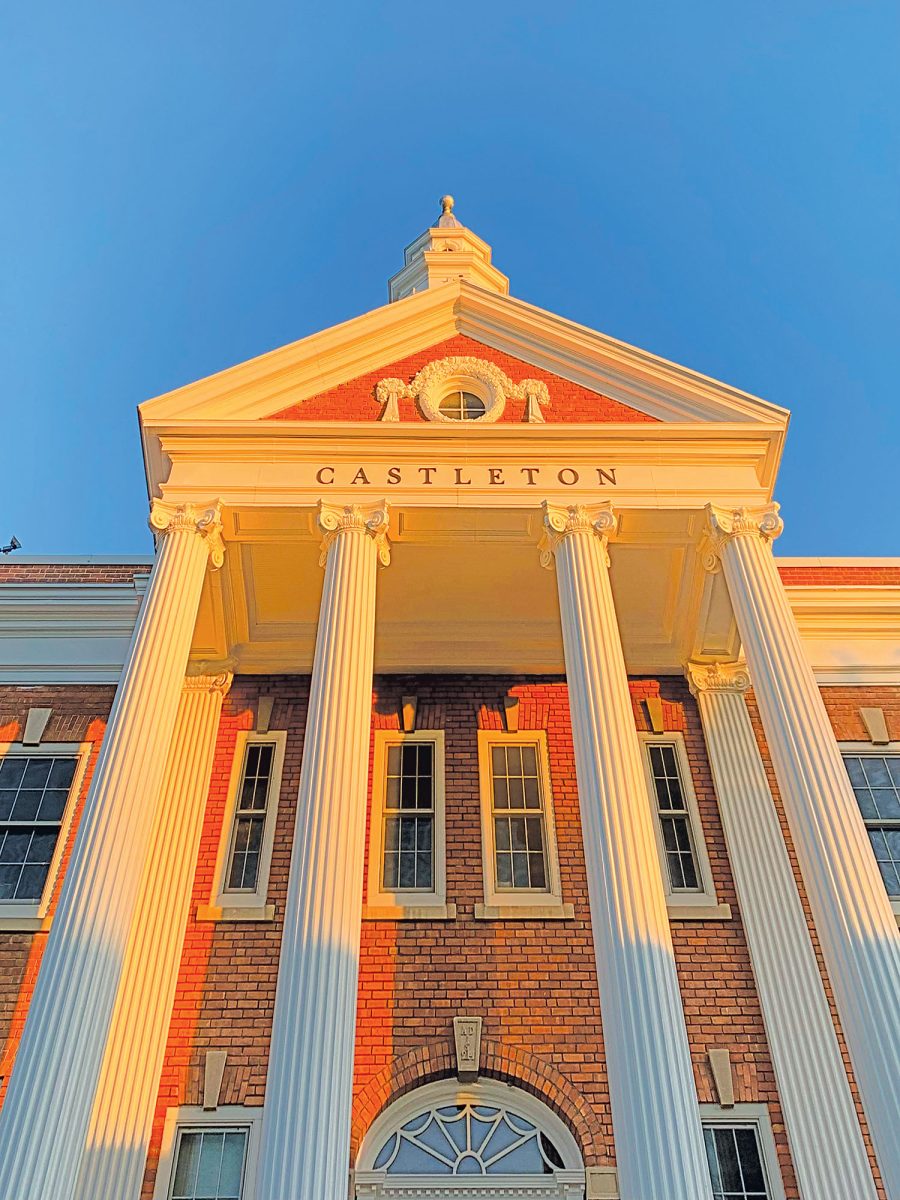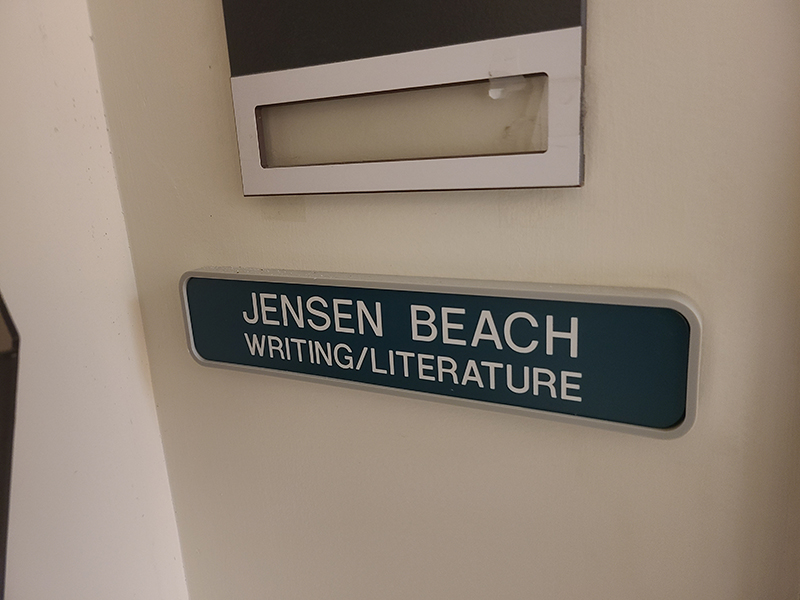I’m new here, but I’m not.
I began my college education at Castleton University. I was privileged to experience campus life prior to the onset of the COVID-19 pandemic, which effectively ended my freshman year.
After almost four years at Castleton, I’ve since relocated to complete a handful of remaining credits at the Johnson campus.
The transition between campuses was smooth, a feat I credit to my dedicated advisor. As I reflect on my time in Castleton and adapt to this different location, I’ve found myself drawing several comparisons between Johnson students and myself.
In September of 2021, the Board of Trustees voted to create a single institution, merging the Castleton campus with Northern Vermont University and Vermont Technical College.
For a multitude of reasons, the decision to consolidate was received negatively by the student population across the state. Protests followed, as did questions. How would this merger affect the structure of our university? How would campus life, activities, and associations be impacted?
The most frustrating consequence of the merger has been the lack of transparency. Oftentimes, the administration seems to embody an “ask for forgiveness, not for permission” attitude that leaves both students and staff in the lurch.
As new administrators entered the seemingly revolving door, the answers to our questions shifted with the leadership. The word “interim” haunted us, semester after semester. Despite the administration’s assurances, years of uncertainty and leadership changes have followed.
A few incidents stick out to me more than others, moments when my peers and I felt blindsided and left at a disadvantage.
In my junior year, the air of uncertainty on campus shifted to anger. I attribute this to President Parwinder Grewal’s announcement of the immensely unpopular (and ultimately unsuccessful) plan to close physical libraries. The infamous email casually confirmed the closure of physical libraries across Vermont State University (VTSU) campuses and the elimination of library staff positions.
The plan also proposed downgrading sports programs on the Johnson and VTC campuses.
Students were not notified prior to the public email, but more importantly, neither was the library staff, whose livelihoods depended on their employment.
The disregard for both students and staff ignited a sense of fury across our campuses.
That anger was further reflected in the vote of “no confidence” from faculty and staff unions and student government associations. The recurring pattern of poorly received choices, followed by resignations, left students to conclude that the administration doesn’t care.
Former President Grewal’s resignation came to no one’s surprise. But how many people were behind this decision? Who else authored this plan, and who approved it?
As a student, it’s disheartening to know the administration thought it was appropriate to end the careers of our dedicated library staff via email. How can we trust those individuals to make decisions for the student body, after they so blatantly showed their disregard for our input?
Amid my fourth year, another unexpected change in staff had a ripple effect for seniors and Capstone students across campus.
Capstone presents fourth year students with the opportunity to work independently on an internship or significant writing project, such as a portfolio or research-based thesis.
For our first English majors Capstone meeting, our instructor asked which students were interested in internships. Almost everyone in the room, me included, raised our hands.
Castleton Capstone students interested in internships were typically directed to the Internship and Career Services Center, to connect with Director of Career Services, Renee Beaupre-White, or Jessica Duncan, Director of Experiential Learning.
One brave student decided to break the news, “Renee is gone. I’m not sure about Jessica.”
Over winter break, the administration had “restructured,” for lack of a better word, the Internship and Career Services department. Renee was gone, entirely. Jessica Duncan’s position was unclear. Apparently, all VTSU campuses were now sharing one Internship Coordinator.
Our professor was taken aback, having not been made aware of this change despite his role as a Capstone instructor.
He expressed his frustration at being blindsided. “Why would they do that in the middle of the year? They know I have Capstone students looking for internships. It’s January, I don’t even know where to start with this.”
Someone asked, “Who do we go to for an internship then?”
He replied, “You’re on your own, as far as I know.”
No one in my Capstone had an internship that semester. To the best of my knowledge, the shared Internship Coordinator was only on our campus once or twice a week.
Whether or not the Internship and Career Services department required restructuring, the timing of this decision could not have been more reckless. The confusion surrounding internships put many Capstone students at a disadvantage, and opportunities were surely lost as result. The loss of such a resource had an immediate impact on students, in the middle of the academic year.
On the Johnson campus, the student experience reflected a similar sense of chaos and confusion.
Johnson student Dayne Bell recalled the disorder and uncertainty after the abrupt loss of staff in the Alumni department in 2023. The campus potentially missed out on thousands of dollars in scholarships and other funding, as a result.
At the time, Assistant Vice President of Institutional Advancement and Alumni Relations Lauren Philie oversaw the annual “Phone-a-thon” fundraiser. Student workers, who applied for the position for direct hire, would contact alumni to ask for donations. These donations fund alumni scholarships and other resources.
Bell said at the last Phone-a-thon, occurring November of 2022, students were told they raised a little over $14,000 in scholarship funds by the end of the second week. By the end of the fourth week, they were at around $23,000.
The following year, the “Optimization” plan made its debut across our campuses. Philie’s position was “on the chopping block,” raising questions about whether the Phone-a-thon would occur. Bell was under the impression that the Phone-a-thon would occur, with applications for student workers being submitted and fliers passed around.
Bell said students were told, “It’s gonna happen, because it’s a big scholarship, we raised a lot of money for that.”
Students applied to work the fundraiser, but weeks went by without any notification or new information about the Phone-a-thon. Bell then reached out to Philie for clarification, who said, “I have no idea, I’m gonna be gone.”
The Phone-a-thon did not happen that year, nor has it happened since.
Bell said this loss was detrimental to the community for several reasons. This fundraiser was a method of gathering feedback for the University, and students also collected new and updated information about VTSU alumni.
Bell said since then, it feels like the community has had a negative perspective of campus. In one instance, the SGA was asking for donations for the school’s annual Casino Night. Bell said many people were upset they were asking for donations and wanted nothing to do with the University at the time.
“It was obvious where their frustration was coming from. A lot of people we were talking to were alumni in town, and members of the community who didn’t have a good view of the University because of the faculty and staff cuts that were being made.”
Another Johnson student, Wilbur Hayes, said the merger has effectively gutted one of the campus’s most beloved programs.
Hayes said their peers initial reaction of hesitance quickly turned into opposition after the University announced its plan to eliminate up to 33 faculty positions, with many of the academic programs associated with those faculty being consolidated or cut.
Hayes recalled receiving a text from a friend about the imminent changes saying, “Did you see what they just sent out? Theater is basically just being erased on the Johnson campus.” Hayes said their immediate reaction was, “No, it’s not. It can’t be.”
Issac Eddy, creator and coordinator of the Performance Arts and Technology program, was one of the many faculty members that received a buyout. Eddy served as Chair of the Theatre Department for nine years.
Hayes and other students were devastated to learn of Professor Eddy’s buyout. “I just broke down because one of my biggest reasons for coming to Johnson was because of Isaac and knowing this man, who was a Blue Man for 12-and-a-half years,” said Hayes.
“Getting to be taught by this incredible theater maker, the same man who made the Listen Up project, which had been something that I had seen pictures of all throughout high school. Just being blown away about the fact that I get to work with this man, but also the relationship that I was able to create with that same man and having the result to be, ‘Oh, he’s not going to get to see you graduate.’ That was soul crushing.”
According to Hayes, the theatre department has not recovered from this loss and operates on “bare bones,” with Professor Laura Roald taking the mantle after Eddy’s departure.
“She is also the person directing our current show. And she is a powerhouse of a human being. She’s incredible. But I also know that one person can only do so much in comparison to a fully functioning program.”
This unexpected transition in leadership has raised many questions about the future of performance arts on the Johnson campus. Hayes is particularly concerned about how this affects up-and-coming seniors, and other students who were amid completing the program when this decision was implemented.
The University currently plans to “teach out” the remaining Performance Art and Technology students, with part-time faculty directing the dramatic and musical productions.
Ultimately, the high turnover in both leadership and faculty at VTSU has left many students feeling uncertain and frustrated.
None of the administration’s messaging has disguised that it’s all about cutting expenses; but at what cost to the student experience?
Will alumni fundraising resume at some point in the future, for scholarships and other resources? Will the Dibden Center for the Arts be utilized to its fullest potential, if performance arts programs have been eliminated from campus?
Has the administration acknowledged the impacts on the student body of what has become a constant cycle of changing leadership and plans?
At a time when we are supposed to be focused on our academics, students have had to endure additional stresses. Questions remain unanswered. The benefits of merging remain unseen to many.
Although much has changed for the VTSU staff and students, one thing remains constant: the revolving door is still spinning.






